Theological Commentary Collection (119 vols.)
Digital Logos Edition
Overview
Broaden your biblical study with this collection of theological commentaries coupled with the power of Logos. Theological commentaries provide more attention to the theological topics and themes and the variety of authors provides you with an array of standpoints on the biblical text.

- Title: Theological Commentary Collection
- Publishers: Westminster John Knox; Eerdmans; P&R; Bloomsbury; Cascade; Fortress Press; Smyth & Helwys; T&T Clark
- Volumes: 119 vols.
- Resource Type: Commentaries
- Topic: Biblical Studies
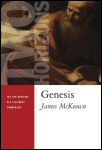
In this commentary, James McKeown treats Genesis as a book of beginnings and a foundational sourcebook for biblical theology. He begins with exegesis of the Hebrew text, highlighting the recurrence of key words, phrases, and themes throughout the book. He also draws attention to passages particularly pertinent to earlier readers either facing or returning from exile, offering a historical context outside a solely Christian perspective. The second half of the book unpacks the numerous theological horizons of Genesis—main unifying themes (descendants, blessing, land); key theological teachings of Genesis (creation, fall, character and image of God, life of faith); and the contribution of Genesis to theology today, including its impact on science, ecology, and feminist theology. McKeown’s Genesis provides a solid examination of a scriptural book that reflects the struggles and hopes of its readers—ancient and modern—and offers encouragement for their walk with God.
James McKeown is vice principal of Belfast Bible College and lecturer in Old Testament at the Institute of Theology, Queen’s University Belfast.
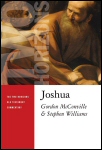
Gordon McConville and Stephen Williams interpret the book of Joshua in relation to Christian theology, providing exegetical commentary and reflection on an often-troubling book that nonetheless plays a key role in the biblical drama of salvation. McConville and Williams address significant theological themes in Joshua, such as land, covenant, law, miracle, judgment, and idolatry. They posit that the theological topics engaged in Joshua are not limited to the horizons of the author and first readers of the book, but that Joshua is part of a much larger testimony that concerns readers yet today.
J. Gordon McConville is professor of Old Testament studies at the University of Gloucestershire, Cheltenham, England.
Stephen Williams is professor of systematic theology at Union Theological College, Belfast, Northern Ireland.
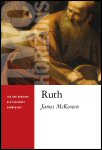
In this commentary, James McKeown approaches the book of Ruth as part of the whole canon of Scripture, exploring not only the content of the book itself but also its relationship to other biblical books. He shows in particular how Ruth overflows with allusions to Genesis. The themes of “blessing,” “seed,” and “land” are common to both books, and studying Genesis and Ruth together provides profound insights into the providential working of God to fulfill the promises made to Abraham, Isaac, and Jacob.
In addition to his exegetical commentary on the text of Ruth, McKeown provides useful background material on how the book has been interpreted throughout history, including Jewish interpretation, and he focuses on Ruth’s theology and its application. His discussion also touches on such related topics as universalism, feminist studies, and the missiological significance of the book of Ruth.
McKeown’s insightful commentary will enable students, pastors, and laypeople to better understand the ancient book of Ruth so that they can better apply its message and wisdom today.
This commentary should be required reading for all who study and teach or preach the message of the book of Ruth.
—Daniel Block, professor of Old Testament, Wheaton College
James McKeown is vice principal of Belfast Bible College and lecturer in Old Testament at the Institute of Theology, Queen’s University Belfast.
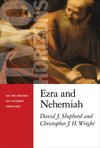
Two features especially distinguish the Two Horizons Old Testament Commentary series: theological exegesis and theological reflection. Both of these features are fully realized in this THOTC volume on Ezra and Nehemiah by David J. Shepherd and Christopher J.H. Wright.
Following an introduction and concise, verse-by-verse commentary on both books, Shepherd and Wright highlight key ways in which these Old Testament texts continue to speak to us today. They closely examine what Ezra and Nehemiah tell us about God and the people of Israel, reflect practically on leadership, and engage critically with those portions of the text (such as Ezra’s dissolution of the Judeans’ marriages with foreigners) that present special problems for contemporary readers.
Offering deep theological insight throughout, this volume will prove essential for students, pastors, and other Christian leaders seeking to engage in theological interpretation of Scripture.
Christopher J.H. Wright is international ministries director for Langham Partnership. His other books include Old Testament Ethics for the People of God and The Mission of God: Unlocking the Bible’s Grand Narrative.
Dr. David J. Shepherd is assistant professor in Hebrew Bible/Old Testament at Trinity College Dublin. Dr. Shepherd was previously worked in the department of Theology and Religious Studies at the University of Chester. In addition to founding and cochairing the Bible and Moving Image programme unit of the Society of Biblical Literature’s International Meeting, Dr. Shepherd is currently a member of the board of the International Organization for Targum Studies as well as the committee of the Society for Old Testament Studies (UK).
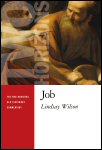
In this commentary Lindsay Wilson shows the book of Job to be a coherent literary work that addresses this question: Is it possible for humans to have genuine faith in God regardless of their circumstances? Wilson argues that Job’s bold, sometimes questioning cries to God are portrayed as legitimate expressions of trust for a righteous person in adversity.
Through critical exegesis of the text, Wilson focuses on the message of Job and its implications for practical ministry, examining such key issues as suffering, justice, lament, and faith. He also touches on various pertinent topics in Christian ethics, including individual character, wealth, suicide, and the environment. In a final section Wilson offers guidance on using Job as a resource book for pastoral care and prayer, and he discusses how to teach and preach from the book of Job.
In his masterful treatment of the book of Job, Lindsay Wilson has constructed a bridge between the ancient Hebrew text and the contemporary reader.
—Daniel J. Estes, distinguished professor of Old Testament, Cedarville University
Anyone wrestling with the issues raised by the book will find here a resource that builds a robust faith rooted in exegetical and theological depth.
—David Firth, lecturer in Old Testament and director of research degrees, University of Nottingham
I warmly commend this volume to serious Bible readers and especially to preachers, theologians, and evangelists who in different ways may be unsure of the importance of the book of Job for their tasks.
—John Woodhouse, former principal, Moore Theological College
Lindsay Wilson is academic dean and senior lecturer in Old Testament at Ridley Melbourne Mission and Ministry College in Australia. He is also the author of Joseph Wise and Otherwise: The Intersection of Covenant and Wisdom in Genesis 37–50.
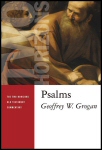
Geoffrey Grogan tackles the growing field of Psalms research and presents an accessible theological treatment of the Psalter. He begins by surveying and evaluating the main scholarly approaches to Psalms and then provides exegesis of all the psalms, emphasizing their distinctive messages. Grogan follows with a full discussion of the Psalter’s theological themes, highlighting the implications of its fivefold arrangement. He considers the massive contribution of the Psalter to biblical theology, including the way the psalms were used and interpreted by Jesus and the New Testament writers. The volume closes with an analysis of the contemporary relevance of the Psalms and a step-by-step guide to preparing a Psalms sermon, based on Psalm 8.
Geoffrey W. Grogan is a lifelong theological educator. His previous works include commentaries on Isaiah, Mark, and 2 Corinthians and books on the Trinity, Christology, and the theology of the Psalms.

In this erudite yet accessible commentary Ernest Lucas elucidates the book of Proverbs both exegetically and thematically. Explicating the text in light of its ancient Near Eastern context, Lucas also shows the relevance of Proverbs for the twenty-first century, speaking as it does to such issues as character formation, gender relations, wealth and poverty, interpersonal communication, science and religion, and care for the environment.
Lucas uniquely identifies “proverbial clusters” in his critical exegesis of the biblical text and uses them as the basis for interpreting individual proverbs. Several substantial theological essays at the end of the book illuminate major ethical, pastoral, and spiritual themes in Proverbs. Ably unpacking the rich wisdom embedded in the book of Proverbs, Lucas’s accessible theological commentary is perfect for pastors, teachers, and students.
A deep and valuable education in biblical wisdom. Lucas has a readable style that will engage students, pastors, and scholars. He bears his impressive scholarship on Proverbs lightly and serves it up winsomely. I especially welcome the essays on the theology and ethics of wisdom that conclude the book. They merit a wide variety of readers — whoever wishes to make the wisdom of Proverbs their own.
—Raymond C. Van Leeuwen, professor emeritus of biblical studies, Eastern University
Offers a window on a fascinating historical topic: ecumenical dialogue between the Catholic and Reformed churches.
Choice
Ernest Lucas worked in biochemical research for a few years before studying theology at Oxford University and becoming ordained as a Baptist minister. He has been the minister of churches in Durham and Liverpool. While at Liverpool, he was awarded a PhD by the university there for his research on the book of Daniel. For several years he worked as educational director and the associate director at the London Institute for Contemporary Christianity. In 1994 he moved to Bristol Baptist College, an affiliated college of Bristol University, where he is vice-principal and tutor in Biblical studies.
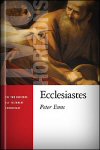
Ecclesiastes is an Old Testament book with a long history of diverse and contradictory interpretations. Even basic questions—who wrote the book, when, and for what purpose—perennially plague scholars. The book’s theological message is likewise elusive, hidden in riddles and convoluted trains of thought that twist and turn back upon themselves.
In this expert commentary on Ecclesiastes, Peter Enns neither disregards nor attempts to resolve the book’s many theological tensions and ambiguities. Rather, he shows how these form the backdrop against which the author struggles to show readers the proper path forward in their journeys of faith—remaining true to the tradition to “fear God and keep the commands” despite the apparent futility of human existence.
Peter Enns is currently senior fellow in biblical studies at the BioLogos Foundation. Previously, he has taught at Westminster Theological Seminary, Harvard University, Princeton Theological Seminary, and Fuller Theological Seminary. His books include Incarnation and Inspiration: Evangelicals and the Problem of the Old Testament and (with Tremper Longman III) Dictionary of the Old Testament: Wisdom, Poetry, and Writings.
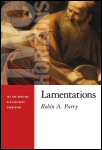
In this volume, Robin Parry not only builds on traditional scholarship to interpret the book of Lamentations within its ancient context but also ventures further, exploring how the book can function as Christian Scripture. Parry provides the first systematic attempt to read Lamentations in light of the cross and resurrection—as Israel’s Holy Saturday literature, filled with the cries of those caught between the death of Jerusalem at the hands of the Babylonians and its rebirth. While Lamentations has been sadly neglected by a culture averse to grief and tragedy, this anguished poetry of pain—especially when read through the lens of Christ’s agony and death—has much to teach us about life, God, and the right response to human suffering.
Robin A. Parry is former editorial director of Paternoster Press, Carlisle, UK. His books include Old Testament Story and Christian Ethics, Universal Salvation? The Current Debate, and Worshipping Trinity: Coming Back to the Heart of Worship.

In this commentary, Old Testament scholar Bo Lim and theologian Daniel Castelo help the church recover and read the prophetic book of Hosea in a way that is both faithful to its message and relevant to our contemporary context. Although Hosea is rich with imagery and metaphor that can be difficult to interpret, Lim and Castelo show that with its focus on corporate and structural sin it contains an important message for today’s church. Critically engaging the ancient biblical text, Lim provides a running commentary on Hosea, which is interspersed throughout with theological essays by Castelo. Their interdisciplinary work offers a constructive model for how the church might read and proclaim the message of Hosea today.
Lim and Castelo have written an up-to-date commentary with a compelling combination of critical alertness and theological sensibility. Probing the deep prophetic claims of the book of Hosea that draw us into the mysterious fidelity of God, they offer their commentary in readable essays that are not cluttered by the usual minutiae of most commentaries. This is a welcome read!
—Walter Brueggemann, William Marcellus McPheeters Professor of Old Testament Emeritus, Columbia Theological Seminary
This skillful collaboration is a model of how thoughtful, balanced, and rigorous scholarship may serve the theological enterprise. The challenges of reading and understanding Hosea are formidable, but one gains from this fruitful pairing of biblical scholar and theologian an informative, lucid, and theologically profound guide to the prophetic book. Whether one is looking for exegetical help or seeking to understand Hosea's contemporary voice, this commentary will prove indispensable.
—Michael Legaspi, professor, Pennsylvania State University
Bo H. Lim is associate professor of Old Testament at Seattle Pacific University and Seminary.
Daniel Castelo is associate professor of dogmatic and constructive theology at Seattle Pacific University and Seminary. He is also the author of Theological Theodicy.

Readers of the book of Micah learn a great deal about God: he is a mighty God who controls the nations, yet he is also concerned with everyday matters like equity, poverty, and care for widows and orphans. In presenting this transcendent-yet-immanent God, Micah’s message revolves around themes of justice, judgment, and salvation that continue to carry great significance today.
In this theological commentary on the book of Micah, Stephen Dempster places the text in conversation with the larger story of Scripture. After discussing questions of structure and authorship in his introduction, Dempster systematically works through the text, drawing links to the broader biblical story throughout. In the second part of his commentary, Dempster offers theological discussion that further explicates the most significant themes in Micah and their applicability to today’s Christians.
Stephen G. Dempster is professor of religious studies at Crandall University, Moncton, New Brunswick.
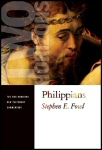
In this fine new commentary on Paul’s letter to the Philippians, Stephen Fowl notes that for the great premodern commentators of the Christian tradition, the literal sense of Scripture is always regulated by theological concerns. Thus, unlike commentaries that simply append theology to historical criticism, Fowl’s volume displays disciplined attention to the text of Philippians in ways that enhance rather than frustrate theological inquiry. While Fowl engages the great scholars of the past, John Chrysostom and Thomas Aquinas among them, he also draws a novel theology of friendship from Paul’s letter and unpacks how the teachings of Philippians might be embodied today by Christians in the West.
Stephen E. Fowl is professor of theology at Loyola College in Maryland. His previous books include The Story of Christ in the Ethics of Paul, Reading in Communion (with L. Gregory Jones), and Engaging Scripture.
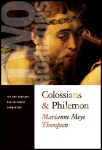
Colossians and Philemon have traditionally been overshadowed by other New Testament texts thought to express Pauline theology more clearly. In this notable commentary, however, Marianne Meye Thompson shows how these two epistles provide a unique formulation of the gospel in terms of creation and reconciliation rather than justification by faith. In Colossians she finds an overarching narrative of the Bible’s grand creation-redemption story and an important emphasis on the relationship between creation and Christology, while her exploration of Philemon casts brighter light on the significance of Paul’s familial metaphors for the church and the meaning of new humanity in Christ. Throughout her work on these two epistles, Thompson continually connects her insights to theological concerns, making this volume an excellent addition to the Two Horizons series.
Marianne Meye Thompson is George Eldon Ladd Professor of New Testament at Fuller Theological Seminary, Pasadena, California, and an ordained minister of the Presbyterian Church. Her previous books include commentaries on the Gospel of John and the Johannine epistles.

In this commentary Andy Johnson engages with the developing interpretive framework of missional hermeneutics to present a theological interpretation of 1 & 2 Thessalonians that aims to help the church more fully participate in the life and mission of the triune God.
After a verse by-verse commentary, Johnson closely examines the theology of the two epistles, focusing especially on the topics of eschatology, holiness, and election in light of his missional reading of 1 and 2 Thessalonians. In his exegetical and theological analyses, Johnson considers canonical concerns, doctrinal commitments, ecclesial practices, proposals from contemporary systematic theology, and insights gleaned from the field of neuroscience regarding personal and community formation, all of which help to clarify and enrich readers’ understanding of various passages.
Andy Johnson has written an extraordinary commentary on the Thessalonian letters from the perspective of their missional dynamic and purpose. It is at once exegetically perceptive, theologically rich, and missionally insightful. Johnson’s volume will assist all those who read it both to better understand this early Pauline correspondence and, if they so desire, to participate more fully in the mission of the Triune God to which these texts bear eloquent witness. A landmark contribution to the commentary genre.
—Michael J. Gorman, St. Mary’s Seminary & University
This splendid commentary on 1 and 2 Thessalonians not only contributes to our understanding of these letters but also serves as a benchmark example of the practice of missional hermeneutics.
—John R. Franke, The Gospel and Our Culture Network
Reflecting thoughtful engagement with recent scholarly developments in both theological interpretation and missional hermeneutics, Johnson has produced a pioneering work. Exegetically judicious, theologically astute, and canonically informed, this volume will serve as a welcome guide for those seeking to navigate the theological content and the missional implications of 1 and 2 Thessalonians.
—Michael Barram, Saint Mary’s College of California
If I were asked to teach a class on 1 and 2 Thessalonians, I would do it with the Bible in one hand and this commentary in the other! With sane and meticulous attention to exegetical detail, Johnson is clear about what he believes to be the thrust of Paul’s message in these letters, and he offers his interpretation with a gracious spirit.
—George R. Hunsberger, Western Theological Seminary
Andy Johnson is professor of New Testament at Nazarene Theological Seminary, Kansas City, Missouri, and coeditor of Holiness and Ecclesiology in the New Testament.
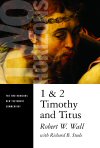
This theological commentary on 1 & 2 Timothy and Titus by Robert Wall powerfully demonstrates the ongoing relevance and authority of the Pastoral Epistles for the church today. Wall uniquely employs an apostolic “Rule of Faith” methodology for interpreting these texts as sacred Scripture. Three successive historical case studies by Richard Steele vividly instantiate key themes of the Pastorals. This innovative yet reverent volume will help revive the interest of students, pastors, and other Christian leaders in the Pastoral Epistles.
I commend Rob Wall for offering us, and the wider church, his canonical readings of the Pastoral Epistles. Rob does not shy away from the many tough passages in these letters, always trying to present what he sees as the “plain sense” of the text in relation to other historical, ecclesial, and cultural understandings. The combination of commentary and reading by the ‘rule of faith’—supplemented by three interesting case studies—provides a thorough canonical understanding of these crucial letters from the standpoint of one who is immersed in what it means to understand the Bible as the church’s book.
—Stanley E. Porter, president, dean of theology, and professor of New Testament, McMaster Divinity College
Those of us who are long-standing admirers of Rob Wall’s work will recognize that the Pastoral Epistles, with all of their critical baggage, provide the perfect backdrop for his canonical approach to Scripture. Wall never shrinks back from crucial questions. Nevertheless, he carefully and confidently interprets the Pastorals as full members of the canon. His readings are theologically apt and lively, shaped and regulated by the church’s faith.
—Stephen Fowl, chair of the department of theology, Loyola College
Robert W. Wall is Paul T. Walls Professor of Scripture and Wesleyan Studies at Seattle Pacific University.
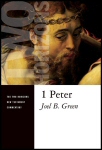
Even though the letter of 1 Peter has sometimes been overshadowed by Paul’s many New Testament letters, it is nonetheless distinctive for the clarity with which it presents the Christian message. In this volume Joel Green offers a clear paragraph-by-paragraph analysis of 1 Peter and, even more, unpacks the letter’s theology in ways that go beyond the typical modern commentary. Following Green’s paragraph-by-paragraph commentary is an extended discussion of the “theological horizons” of 1 Peter. Throughout his study Green brings the message of 1 Peter into conversation with Christian theologians—ancient and contemporary—so that the challenge of this letter for Christian faithfulness can be heard more clearly today.
Joel B. Green is professor of New Testament interpretation and associate dean for the Center of Advanced Theological Studies at Fuller Theological Seminary, Pasadena, California.
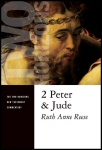
Ruth Anne Reese explores the theological and literary meaning of 2 Peter and Jude with an emphasis on theology for the church today. She seeks to meld together the best tools derived from the disciplines of both biblical studies and theology. Reese’s 2 Peter and Jude begins with a general introduction to the two books and proceeds to look at each text, exploring the meaning of particular words and illuminating the text with elements of history, sociology, and literary study. The themes of each book—and how they are played out throughout the biblical canon—are examined from an explicitly theological angle. Reese brings together insights from the best of biblical scholarship with the work of theologians, both contemporary and ancient. The combination of disciplines leads to new insights on such issues as judgment, community living, and the relationship between faith and ethics.
Ruth Anne Reese is associate professor of New Testament at Asbury Seminary, Wilmore, Kentucky. She is also the author of Writing Jude: The Reader, the Text and The Author in Constructs of Power and Desire.

The book of Revelation is perhaps the most theologically complex and literarily sophisticated—and also the most sensual—document in the New Testament. In this commentary John Christopher Thomas’s literary and exegetical analysis makes the challenging text of Revelation more accessible and easier to understand. Frank Macchia follows up with sustained theological essays on the book’s most significant themes and issues, accenting especially the underappreciated place of the Holy Spirit in the theology of Revelation.
This is a welcome addition to recent literature on Revelation. It offers a multidimensional perspective on the book that gives special attention to its literary character and theological dimensions. By bringing the perspectives of a biblical scholar and a systematic theologian together, the commentary serves as an invitation for others to join in the dialogue about the interpretation and significance of Revelation’s visionary text.
—Craig Koester, Luther Seminary, St. Paul, MN
An evocative, provocative theological commentary of first rank. Chris Thomas’s fine commentary is informed not only by his fluent reading of the sacred text and its many interpreters but also by his deep commitment to God’s people, especially of the Pentecostal communion. Frank Macchia’s complementary theological reflections are remarkable for their breadth and incisiveness in reading the church’s Scripture and tradition. Theirs is an intellectual achievement for the academy and a magisterial gift to the church.
—Robert W. Wall, Seattle Pacific University and Seminary
John Christopher Thomas is Clarence J. Abbott Professor of Biblical Studies at Pentecostal Theological Seminary, Cleveland, Tennessee, and director of the Centre for Pentecostal and Charismatic Studies at Bangor University, Bangor, Wales.
Frank D. Macchia is professor of systematic and Pentecostal theology at Vanguard University, Costa Mesa, California, and associate director of the Centre for Pentecostal and Charismatic Studies at Bangor University.

In the Christian church the Gospel of Matthew has been considered the most important portrait of Jesus’ life and message. Containing Jesus’ Sermon on the Mount and a uniquely rich collection of parables, among many other things, Matthew has made a major contribution to the church throughout the centuries, and it still has much to say to the church today.
This superb commentary in the Pillar series explores the meaning and relevance of Matthew in an eminently straightforward fashion. Leon Morris writes for readers who use commentaries to discover further what the Bible means. Throughout, he makes clear what he considers to be the meaning of the Greek text that Matthew has bequeathed to the church. A perceptive introduction precedes Morris’s warmhearted verse-by-verse exposition of Matthew, an exposition based on his own literal translation of the text. Now a standard reference work on the Gospel of Matthew, this mature, evangelically oriented commentary will continue to meet the needs of students, pastor, and general readers alike.
Leon Morris retired as principal of Ridley College in Melbourne, Australia, in 1979. He is the author of more than 40 books, including The Apostolic Preaching of the Cross, the volumes on Matthew and Romans in The Pillar New Testament Commentary, and the volumes on John and the Thessalonian epistles in the New International Commentary on the New Testament.

This volume offers exceptional commentary on Mark that clearly shows the second Gospel—though it was a product of the earliest Christian community—to be both relevant and sorely needed in today’s church.
Written by a biblical scholar who has devoted 30 years to the study of the second Gospel, this commentary aims primarily to interpret the Gosepl of Mark according to its theological intentions and purposes, especially as they relate to the life and ministry of Jesus and the call to faith and discipleship. Unique features of James Edwards’s approach include clear descriptions of key terms used by Mark and revealing discussion of the Gospel’s literary features, including Mark’s use of the “sandwich” technique and of imagistic motifs and irony. Edwards also proposes a new paradigm for interpreting the difficult “Little Apocalypse” of chapter 13, and he argues for a new understanding of Mark’s controversial ending.
Based on the New International Version of the Bible and often making reference to the nuance of the Greek original, the commentary provides the reader with a clear, well-informed, and thoughtful interpretation of Mark’s Gospel.
—Southwestern Journal of Theology
James Edwards’s new, careful study of the earliest Gospel brings together his interest in and ongoing research regarding Mark’s work. He does so in a way that will have a broad appeal to a wide audience, including both the academic community and the service of pastors and teachers. This is an excellent piece of applied research and rigorous study.
—Ralph P. Martin, professor emeritus of New Testament, Fuller Theological Seminary
James R. Edwards is professor of religion at Whitworth College in Spokane, Washington. He has written numerous articles in scholarly and popular journals and is a contributing editor of Christianity Today. His other books include The Layman’s Overview of the Bible, The Divine Intruder: When God Breaks into Your Life, and the volume on Romans in the New International Biblical Commentary series.

The Gospel according to Luke
- Author: James R. Edwards
- Publisher: Eerdmans
- Publication Date: 2015
- Pages: 859
In keeping with the Pillar New Testament Commentary’s distinctive character, this volume by James R. Edwards on Luke gives special attention to the third Gospel’s vocabulary and historical setting, its narrative purpose and unique themes, and its theological significance for the church and believers today.
Though Luke is often thought to have a primarily gentile focus, Edwards counterbalances that perspective by citing numerous evidences of Luke’s overarching interest in depicting Jesus as the fulfillment of God’s providential work in the history of Israel, and he even considers the possibility that Luke himself was a Jew. In several excursuses Edwards discusses Luke’s infancy narratives, the mission of Jesus as the way of salvation, and Luke’s depiction of the universal scope of the gospel. While fully conversant with all the latest scholarship, Edwards writes in a lively, fluent style that will commend this commentary to ministers, students, scholars, and many other serious Bible readers.
Edwards deftly leads readers through the historical context, narrative dynamics, and main themes of Luke’s story of Jesus with clear and insightful commentary. This is a useful book for preachers, teachers, and students hoping to delve deeper into the Gospel of Luke.
—Michael F. Bird, Ridley College, Melbourne, Australia
This is a first-rate commentary, written by a seasoned New Testament exegete, reflecting the wisdom and insight we have come to expect from its author. It is built on a foundation of excellent scholarship and in dialogue with the best secondary literature; its approach to the text is reverent and edifying . . . . Immensely rewarding.
—Donald A. Hagner, Fuller Theological Seminary
James R. Edwards is professor of religion at Whitworth College in Spokane, Washington. He has written numerous articles in scholarly and popular journals and is a contributing editor of Christianity Today. His other books include The Layman’s Overview of the Bible, The Divine Intruder: When God Breaks into Your Life, and the volume on Mark in the Pillar New Testament Commentary Series.

In this solid evangelical commentary on John’s Gospel, a respected Scripture expositor makes clear the flow of the text, engages a small but representative part of the massive secondary literature on John, shows how the fourth Gospel contributes to biblical and systematic theology, and offers a consistent exposition of John as an evangelistic Gospel. The comprehensive introduction treats such matters as the authenticity, authorship, purpose, and structure of the Gospel.
Christianity Today - Number 1 Critic’s Choice for Commentaries & Runner-up Reader’s Choice (1992)
D. A. Carson is research professor of New Testament at Trinity Evangelical Divinity School, Deerfield, Illinois. He is the author or editor of more than 40 books, including Sermon on the Mount, Exegetical Fallacies, Matthew (Expositor’s Bible Commentary), Showing the Spirit, The Gagging of God, and (with John Woodbridge) Hermeneutics, Authority and Canon and Letters Along the Way.

15 years in the making, this comprehensive commentary by David Peterson offers thorough exegesis and exposition of the Acts of the Apostles, drawing on recent scholarship in the fields of narrative criticism and theological analysis. It incorporates insights into historical-social background, and investigates why Luke presents his material in the way he does.
In view of how long the book of Acts is—over a thousand verses—Peterson’s commentary is admirably economical yet meaty. His judgments, according to Don Carson, are always “sane, evenhanded, and judicious.” Even while unpacking exegetical details, Peterson constantly scans the horizon, keeping the larger picture in mind. With its solid exegesis, astute theological analysis, and practical contemporary application, Peterson’s Acts of the Apostles is a commentary that preachers, teachers, and students everywhere will want and need.
Here in one convenient volume is the basic introductory information and verse-by-verse exegesis that New Testament students and preachers need in order to understand the second part of Luke’s account of Christian beginnings. This commentary is noteworthy for its incorporation of a full essay on the theology of Acts and its careful attention to theological issues in the course of the exposition, at the same time it does not neglect historical and literary matters. I warmly commend this useful tool for study.
—I. Howard Marshall, University of Aberdeen
David Peterson interacts with Acts scholarship fairly and in an up-to-date way. His literary and historical conclusions are well informed and sound. His introduction airs issues thoroughly, yet the entire work is easy to follow. Peterson consistently engages the cohesive larger picture and the theological message of the book.
—Craig S. Keener, Palmer Theological Seminary
One of the most complex books of the Bible, the Acts of the Apostles, presents readers with formidable historical, literary, and theological challenges. In recent decades scores of researchers have deepened our understanding of the book in each of these areas. David Peterson’s excellent exposition of Acts interacts insightfully with those studies and offers a lucid, compelling, and satisfying interpretation of the book. Like its subject, this commentary is informative, edifying, and challenging. Pastors and teachers will find it to be an invaluable guide to reading Acts with profit.
—Brian S. Rosner, Moore Theological College and Macquarie University
David G. Peterson is senior research fellow in New Testament at Moore Theological College, Sydney, Australia. His previous books include Engaging with God and (with I. Howard Marshall) Witness to the Gospel: The Theology of Acts.

Morris tackles the complexities of faith and interpretation associated with the Epistle to the Romans in this substantial yet easy-to-read commentary, written to be intelligible to the layperson while also taking account of modern scholarship.
Evangelical Christian Publishers Association - Gold Medallion award for Commentaries (1989)
Leon Morris as principal of Ridley College in Melbourne, Australia, in 1979. He is the author of more than 40 books, including The Apostolic Preaching of the Cross, the volumes on Matthew and Romans in The Pillar New Testament Commentary, and the volumes on John and the Thessalonian epistles in the New International Commentary on the New Testament.

Colin Kruse’s commentary on the book of Romans shows how Paul expounds the gospel against the background of God’s sovereign action as creator, judge, and redeemer of the world. In the process, Kruse elucidates Paul’s teaching about matters of concern in the Roman house churches—issues that remain important today. Kruse’s gift for clarity and economy in dealing with such complex and important matters promises to make this commentary an enduring standard for years to come.
The Pillar New Testament Commentary series is quickly establishing itself as the premier mid-level commentary series on the English text of Scripture but written with full awareness of the Greek and all the key exegetical debates that busy pastors and teachers need to know about.
—Craig Blomberg, Denver Seminary
Colin G. Kruse is lecturer in New Testament at the Bible College of Victoria in Melbourne, Australia, where he also coordinates postgraduate research studies. He has written several books, including Paul, the Law, and Justification and New Testament Models for Ministry.

This thorough commentary presents a coherent reading of 1 Corinthians, taking full account of its Old Testament and Jewish roots and demonstrating Paul’s primary concern for the unity and purity of the church and the glory of God. Roy Ciampa and Brian Rosner’s well-informed, careful exegesis touches on an astonishingly wide swath of important yet sensitive issues, reinforcing the letter’s ongoing theological and pastoral significance.
The Pillar New Testament Commentary series is quickly establishing itself as the premier mid-level commentary series on the English text of Scripture but written with full awareness of the Greek and all the key exegetical debates that busy pastors and teachers need to know about. Volumes such as James Edwards on Mark, D. A. Carson on John, David Peterson on Acts, Peter O’Brien on Ephesians, Douglas Moo on Colossians and Philemon and also on James, Gene Green on Thessalonians, Peter Davids on 2 Peter and Jude and Colin Kruse on the Letters of John are as fine as any “competitors” of the same scope in print. And more of the same quality are continuing to appear.
—Craig Blomberg, Denver Seminary
Up to date, replete with many fresh readings, and rooted in the complex historical context that was first century Corinth, this commentary is in touch with those issues that make 1 Corinthians so relevant for the church. Both useful and edifying, Ciampa and Rosner’s work is a partner to keep close at hand as one probes this ethically relevant epistle.
—Darrell L. Bock, Dallas Theological Seminary
Two experts on 1 Corinthians provide detailed yet lucid exegesis of one of Paul’s more difficult letters. I particularly appreciate the very full introduction, which covers many more topics than the usual introductions to a Pauline letter.
—Richard Bauckham, University of St. Andrews
Here 1 Corinthians emerges as a unified and comprehensive exercise in radical theological and ethical reorientation, whereas past interpretations all too often defined its purposes merely in terms of addressing a list of various concerns. This clarification of Paul’s agenda creates a compelling context for thinking about the shape of Christian faith today.
—Philip H. Towner, Nida Institute for Biblical Scholarship
For the past generation research into and commentaries on 1 Corinthians have focused on clarifying the social and literary contexts of the letter. Now Rosner and Ciampa remind us that the primary background for Paul’s theology and ethics was his biblical and Jewish heritage. And in demonstrating how much fresh light can be shed on the letter by taking account of that heritage, they also show that 1 Corinthians still has much to contribute to the discussion of present-day issues.
—James D. G. Dunn, University of Durham
Written in an impressively clear manner and assuming a varied audience of students, pastors, and scholars, this new commentary represents a major contribution to recent discussion of this much-controverted Pauline letter.
—James Carleton Paget, Cambridge University
Roy E. Ciampa is director of the ThM program in biblical studies, associate professor of New Testament, and chair of the division of biblical studies at Gordon-Conwell Theological Seminary in South Hamilton, Massachusetts.
Brian S. Rosner is senior lecturer in New Testament and ethics at Moore Theological College and Honorary Senior Research Fellow in ancient history at Macquarie University, Sydney, Australia. He is the author and editor of a number of books, including Understanding Paul’s Ethics and New Dictionary of Biblical Theology.

The Second Letter to the Corinthians
- Author: Mark A. Seifrid
- Publisher: Eerdmans
- Publication Date: 2014
- Pages: 569
The question that Paul set before the ancient church in Corinth—“Do you not recognize that Jesus Christ is in and among you?” (2 Cor 13:5)—remains a critical question for the church today. This commentary by Mark Seifrid seeks to hear Paul’s message afresh and communicate it to our time.
Seifrid offers a unified reading of 2 Corinthians, which has often been regarded as a composite of excerpts and fragments. He argues that Paul’s message is directed at the “practical atheism” of the Corinthian church—the hidden heresy that assumes God’s saving work in the world may be measured by outward standards of success and achievement.
Mark Seifrid takes a distinctive approach to the commentator's task: rather than cataloging and evaluating the opinions of modern scholars, he chooses to focus on his own fresh, stimulating, and very definite interpretation of the letter.
—Douglas J. Moo, Kenneth T. Wessner Professor of New Testament, Wheaton College
Seifrid brings extraordinary erudition, exegetical precision, and astute theological reflection to the interpretation of this poignant letter. An outstanding addition to an excellent commentary series.
—David E. Garland, interim provost & the Charles J. and Eleanor McLerran Delancey Chair of the Dean, George W. Truett Theological Seminary
Refusing to dice up 2 Corinthians into disparate fragments, this volume presents a coherent if afflicted and sometimes distraught apostle committed to the fulfillment of the mission he has received from the risen Christ. At once a superb work of erudition and devotion.
—Timothy George, dean and professor of divinity history and doctrine, Beeson Divinity School, Samford University
Mark A. Seifrid has been the Mildred and Earnest Hogan Professor of New Testament Interpretation at The Southern Baptist Theological Seminary. Author of Justification by Faith and Christ our Righteousness, he is also a member of the Society of Biblical Literature and the Society of New Testament Studies. Seifrid is co-author of Justification and Variegated Nomism (2 vols.).

In this commentary G. Walter Hansen offers rich exposition of the text of Philippians as well as wisdom and maturity in its application. In so doing he emphasizes partnership—the social and corporate dimensions of community—in the progress of the gospel.
After a select bibliography, Hansen’s introduction sets forth the historical setting of the church in Philippi, the nature and occasion of the letter, and a preview of two key themes—the gospel of Christ and the community in Christ. The commentary itself discusses Philippians in light of these themes, considering Paul’s greetings, reports of gospel ministry, imperatives for citizens worthy of the gospel, recommendations of two Christ-like servants, and disclosures of his personal experience. Hansen’s treatment as a whole is distinctive for the way it draws out and highlights the themes of partnership, citizenship, and friendship in Paul’s Philippian letter.
With themes and emotions so varied, the letter to the Philippians needs a commentator with a sure grasp and a warm heart. . . . Hansen writes with admirable clarity and simplicity, even when he is unpacking notoriously complex matters.
—D. A. Carson, research professor of New Testament, Trinity Evangelical Divinity School, Deerfield, Illinois
Walter Hansen, representing that rare combination of a first-rate scholar and a pastor with years of experience in the church, writes the kind of commentary one might expect—devoted to solid, informed exegesis with an emphasis on the present application of the text. Its exceptional clarify, depth, and theological richness make this an outstanding commentary that will be of real help to every student of Philippians.
—Donald A. Hagner, Fuller Theological Seminary
Here is a significant commentary on Paul’s letter to the Philippians that is suitable not only for scholars but also for ministers, laypeople, and students. It is theologically sound, critically balanced, exegetically perceptive, pastorally relevant, and ethically focused. It needs to be read, closely studied, and—more importantly—allowed by God’s Spirit to reorganize our thinking and restructure our living. . . . Erudite, challenging, and a good read.
—Richard Longenecker, Wycliffe College, Toronto
G. Walter Hansen is the seminary professor for global theological education at Fuller Theological Seminary.

Exhibiting the same brilliant exegesis and sound practical insight found in his previous works, noted commentator Douglas J. Moo, in this new volume, not only explains accurately the meaning of the letters to the Colossians and to Philemon but also applies that meaning powerfully to twenty-first century readers. Moo attentively interacts with the Greek text of these letters and clearly explains the English text to a contemporary audience.
Informed, evangelical, methodologically astute, and displaying a careful balance between good scholarship and pastoral concern—earmarks of the Pillar New Testament Commentary—Moo’s Letters to the Colossians and to Philemon will offer insights to a wide range of readers, from teachers and students, to pastors and parishioners, to scholars and laypersons.
Moo has done it again! Just as his Pillar volume on James and his NICNT volume on Romans both rank, in my estimation, as the best available intermediate-level commentaries on those books, now he has produced a comparable volume on Colossians and Philemon. Clear, judicious, abreast of all the relevant scholarship, yet not unnecessarily long, this book should be the first choice of most pastors and teachers for help with exegeting these delightful little Pauline letters.
—Craig Blomberg, Denver Seminary
This fine Pillar commentary by Doug Moo not only matches his volume on James but also is in keeping with his masterly exposition of Romans in the New International Commentary Series. His present work is characterized by insightful, sensitive exegesis and thoughtful interaction with the vast array of recent literature on Colossians and Philemon. A surefooted guide, Moo leads the reader to understand the meaning of the biblical text, to grasp its theological significance and thus to hear afresh the gospel of the Lord Jesus Christ that is ‘bearing fruit and growing throughout the whole world.’ Moo’s commentary is a must for every serious student of these two brief yet profound Pauline letters.
—Peter T. O’Brien, Moore Theological College
Outstanding. . . . Doug Moo combines his exegetical skill and extensive knowledge of the nuances of Pauline theology into a compelling explanation of the meaning of Colossians and Philemon. Readers will appreciate Moo’s wise judgment as he navigates through a variety of interpretational issues. Very well written and richly informative, this commentary should be the textbook of choice for courses on these two letters.
—Clinton E. Arnold, Talbot School of Theology, Biola University
Douglas J. Moo is Blanchard Professor of New Testament at Wheaton Graduate School. His previous commentaries include the NICNT volume on Romans and Pillar New Testament Commentary: The Letter of James.

In this commentary, Gene Green reads Paul’s two letters to the Thessalonians in light of the canon of Scripture and of new knowledge about the first-century world of Thessalonica. This fruitful approach helps illuminate the impact of the gospel on its original readers and, in turn, shows how potent a force it can be for the church and society today.
The book begins with an in-depth study of the Thessalonians themselves—their history, land, socioeconomic conditions, and religious environment. This fascinating discussion gives the necessary context for fully appreciating the circumstances surrounding the founding of the city’s first church and the subsequent struggles of the Thessalonian believers to live out their Christian faith.
The main body of the book provides informed verse-by-verse commentary on 1 & 2 Thessalonians that extracts the fullest possible meaning from these important New Testament texts. As Green’s exposition shows, the Thessalonian scriptures are especially valuable as letters of friendship and for showing Paul’s pastoral concern for the many areas in which the Thessalonians needed guidance. Some of Paul’s purposes are to thank the new believers for their steadfastness amid suffering, to encourage them in their trials, to urge them not to neglect their daily work, and, no less important, to teach them about the future of believers who die before Christ returns. Indeed, the matter of the last things and the second coming of Christ so permeates these texts that they are often called Paul’s eschatological letters.
Filled with new information about ancient society, this commentary will fast become a standard reference work for Bible study. By carefully bridging the biblical and modern worlds, Green shows with clarity and warmth the continuing relevance of 1 & 2 Thessalonians for contemporary readers.
Gene L. Green is professor of New Testament at Wheaton College in Illinois. He previously served as a missionary in Costa Rica, where he was professor of New Testament at Seminario ESEPA, and he is also the author of Spanish-language commentaries on 1 & 2 Thessalonians and 1 & 2 Peter.

Few books in the New Testament are better known or more often quoted as the Letter of James. Because James is so concise, so intensely practical, and so filled with memorable metaphors and illustrations, it has become one of the two or three most popular New Testament books in the church.
This highly original commentary seeks to make the Letter of James clear and applicable to Christian living today. Interacting with the latest views on James but keeping academic references to a minimum, Douglas Moo first introduces the Letter of James in its historical context and then provides verse-by-verse comments that explain the message of James both to its first readers and to today’s church.
The commentary is most valuable for its excellent exegesis, which is not so technical that the non-scholar would find it tedious. Homiletical and devotional insights, which pervade the work, also make the volume a worthwhile addition to the Bible student’s library.
—Interpretation
There is much to be gained from this commentary, both exegetical and practical, by pastors and serious students.
—Southwestern Journal of Theology
Moo has many insights into the challenges James presents to the Church of his time and of today. James’s contention, that Christians must not only reflect theologically about life but also live a holy and obedient lifestyle, is a timely word which ought to be heard and heeded, especially in the western Church of this new millennium….This re-evaluation of James is much to be commended.
—Methodist Recorder (UK)
Douglas J. Moo is the Blanchard Professor of New Testament at Wheaton Graduate School in Wheaton, Illinois. Formerly, he taught for over 20 years at Trinity Evangelical School in Deerfield, Illinois.

Filling a notable gap in scholarship on 2 Peter and Jude, Peter Davids artfully unpacks these two neglected but fascinating epistles that deal with the confrontation between the Greco-Roman world and the burgeoning first-century Jesus communities. Davids firmly grasps the overall structure of these oft-maligned epistles and presents a strong case for 2 Peter and Jude as coherent, consistent documents. Marked by exceptional exegesis and sharp, independent judgments, Davids’ work both connects with the latest scholarship and transforms scholarly insights into helpful conclusions benefiting Christian believers.
In this well-written and informative commentary on 2 Peter and Jude, Peter Davids helps us read these two fascinating letters in light of their Jewish background. He uses his exegetical skill and knowledge of Judaism to provide satisfying explanations of ‘slandering celestial beings’ and the many other difficult-to-understand passages. This outstanding commentary is clearly a ‘top pick’ on these two letters.
—Clinton E. Arnold, Talbot School of Theology, Biola University
A reliable and literate work—knowledgeable without being cluttered, informed without being pedantic. As a traditional commentary, it argues introductory matters well, relies on epistolary and rhetorical insights for structural guides, and is very well informed on Israelite and Greco-Roman background.... Balances the big canvas with smaller cameo scenes.... Should be considered the best of a new wave of commentaries on Jude and 2 Peter.
—Jerome Neyrey, University of Notre Dame
This is an exemplary commentary, marked by the author’s mature scholarship, keen theological insights, and deep pastoral concerns. His thorough exegesis, conducted with a singular combination of rhetorical and narrative analysis as well as other usual critical methods, has produced a most reliable exposition of these neglected epistles.
—Seyoon Kim, Fuller Theological Seminary
A careful and painstaking treatment of the least well known of the General Epistles… The reader’s curiosity is both stimulated and satisfied by this commentary. It will fill a niche in today’s market and be a welcome addition to the libraries of both scholars and pastors. I commend it with enthusiasm.
—Ralph P. Martin, Fuller Theological Seminary
Peter H. Davids is professor of biblical theology at St. Stephen’s University, St. Stephen, New Brunswick. He is also the coeditor of Dictionary of the Later New Testament and Its Developments.

This Pillar commentary seeks to clearly explain the meaning of John’s letters to teachers, pastors, and general readers looking for a reliable resource for personal study. Colin Kruse introduces the important issues involved in interpreting the Johannine letters, gives verse-by-verse comments, and provides extensive discussion of John’s major theological themes, including the real humanity of Christ, atonement, the role of the Spirit, Christian assurance, the meaning of koinonia, Christian love, and eternal life.
Designed both for serious students and for general readers of the Bible, the Pillar New Testament Commentary volumes seek to make clear the meaning of the text of Scripture as we have it. The scholars writing these volumes interact with the most important, informed contemporary debate yet avoid undue technical detail. Their ideal is a blend of rigorous exegesis and exposition, scholarship and pastoral sensitivity, with an eye alert both to biblical theology and to the contemporary relevance of the Bible.
The exegesis is thorough and convincing. This commentary will serve the parish preacher. It will enlighten epistles that the church does not often ponder enough.
—The Clergy Journal
Kruse, an Australian biblical scholar, is obviously in command of the current literature on the letters of John and writes with a lucid and well balanced perspective on the origin and context of the letters. His commentary is enriched with frequent extended notes that delve into some of the key concepts or more debated aspects of the letters.
—The Bible Today
Those specializing in Johannine studies, as well as pastors and students, will welcome this latest contribution to our (better) understanding of the letters of John.
—Southwestern Journal of Theology
Colin G. Kruse is lecturer in New Testament at the Bible College of Victoria in Melbourne, Australia, where he also coordinates postgraduate research studies. He has written several books, including Paul, the Law, and Justification and New Testament Models for Ministry.
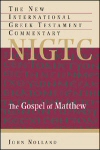
Having devoted the past ten years of his life to research for this major new work, John Nolland gives us a commentary on the Gospel of Matthew that engages with a notable range of Matthean scholarship and offers fresh interpretations of the dominant Gospel in the history of the church.
Without neglecting the Gospel’s sources or historical background, Nolland places his central focus on the content and method of Matthew’s story. His work explores Matthew’s narrative technique and the inner logic of the unfolding text, giving full weight to the Jewish character of the book and its differences from Mark’s presentation of parallel material. While finding it unlikely that the apostle Matthew himself composed the book, Nolland does argue that Matthew’s Gospel reflects the historical ministry of Jesus with considerable accuracy, and he brings to the table new evidence for an early date of composition.
Including accurate translations based on the latest Greek text, detailed verse-by-verse comments, thorough bibliographies for each section, and an array of insightful critical approaches, Nolland’s Gospel of Matthew will stimulate students, preachers, and scholars seeking to understand more fully Matthew’s presentation of the gospel narrative.
Although some may be daunted, or perhaps even wearied, by the appearance of another massive work on the Gospel of Matthew, readers will be pleasantly surprised that Nolland manages to balance exegetical detail with theological perspective which has resulted in a usable and well documented commentary.
—Theological Book Review
A refreshingly clear and accessible contribution that depicts the fruit of very careful, learned, and reasoned scholarship at its finest.
—Journal of the Evangelical Theological Society
Enormously learned, exhaustive in its detailed textual, literary, redaction- and source-critical comments and bibliographical material, and interesting, useful, and accessible to a wide range of readers.
—Religious Studies Review
John Nolland is academic dean and lecturer in New Testament studies at Trinity College, Bristol, England. An ordained minister of the Church of England, he is also the author of the three-volume Word Biblical Commentary on the Gospel of Luke.

Drawing on many years of Marcan studies, world-class scholar R. T. France has produced an exegetical commentary on the Greek text of Mark that does what the best of recent Greek commentaries have done but in France’s own inimitable, reader-friendly way.
This work is a commentary on Mark itself, not a commentary on commentaries of Mark. It deals immediately and directly with matters that France himself regards as important. Working from his own translation of the Greek text and culling from helpful research into the world of first-century Palestine, France provides an extensive introduction to Mark’s Gospel, followed by insightful section and verse commentary.
France sees the structure of Mark’s Gospel as an effective “drama in three acts.” Act 1 takes up Jesus’ public ministry in Galilee. Act 2 covers Jesus’ journey to Jerusalem with his disciples. Act 3 focuses on Jesus’ public ministry in Jerusalem, including his confrontation with the Jewish leaders, his explanatory discourse on the future, and his passion, death, and resurrection. France carefully unpacks for modern readers the two central themes of this powerful narrative of Jesus’ life — the nature of Christ and the role of discipleship.
Supported by careful argumentation and impressive in its sensitivity to Mark’s structure, context, and use of the Old Testament, France’s study of the second Gospel is without peer.
This massive commentary on the Greek text of Mark comes from the pen of an eminent Oxford scholar and British evangelical. . . . The commentary itself is detailed and penetrating. . . . Of particular value are France’s detailed comments on the text of Mark, his extensive bibliography, and his judicious interpretation of Mark’s theology.
—The Bible Today
R.T. France recently retired as principal of Wycliffe Hall, Oxford, and as rector of seven Anglican parishes. Among his many other books are Jesus and the Old Testament, The Evidence for Jesus, Matthew: Evangelist and Teacher, the Tyndale New Testament Commentaries volume on Matthew, and the Doubleday Bible Commentary volume on Mark. He is also coeditor of The New Bible Commentary: 21st-Century Edition.

In this acclaimed commentary—the first in the English language on the Greek text of Luke since those of J.M. Creed in 1930 and H.K. Luce in 1933—renowned New Testament scholar I. Howard Marshall calls special attention to the theological message of Luke the Evangelist. His primary purpose is to exegete the text as it was written by Luke, so that the distinctiveness of Luke’s Gospel may be seen.
While basing his commentary on the UBS Greek New Testament, Marshall also refers to many variant readings that are significant in this study. He provides information on the meaning of the Greek words used by Luke and shows which words and constructions occur frequently and are therefore characteristic of his style. It is by this meticulous analysis of the Greek that Luke’s theological intentions can be objectively determined.
Widely considered to be one of the best commentaries on Luke currently available, Marshall’s work provides the tools needed for the scholarly study of this Gospel—meeting in particular the needs of students of the Greek text—describes the contemporary state of Lucan research, and makes its own important contributions to the understanding of Luke.
I. Howard Marshall’s splendid work takes its place as the best commentary on the Gospel of Luke in English. . . . His careful, sane scholarship and his respect for biblical authority provide a model for evangelical scholarship, indeed for scholars generally, in the study of the Synoptic Gospels.
—Christianity Today
This is without question the best commentary in English on the Greek text of Luke. It is a major invasion into a mine-infested area by a major British scholar. An astonishing achievement. . . It puts Marshall firmly among the forefront of world scholars on St. Luke.
—Church Times
Students of the Greek text will indeed find this volume indispensable. . . It stands alone in the field as a compendium of accessible current research on Luke’s usage of Greek.
—Interpretation
I. Howard Marshall (January 12,—1934 December 12, 2015) was professor of New Testament exegesis at the University of Aberdeen, Scotland. He is a series editor of The New International Greek Testament Commentary and has also served in editorial roles for The Book of Acts in Its First-Century Setting and the Dictionary of Jesus and the Gospels. Among his many scholarly books and commentaries are the volume on the Epistles of John in the New International Commentary on the New Testament series, Luke: Theologian and Historian, and I Believe in the Historical Jesus.

This highly anticipated commentary on the Greek text of Romans by veteran New Testament scholar Richard Longenecker provides solid scholarship and innovative solutions to long-standing interpretive problems. Critical, exegetical, and constructive, yet pastoral in its application, Longenecker’s monumental work on Romans sets a course for the future that will promote a better understanding of this most famous of Paul’s letters and a more relevant contextualization of its message.
Paul’s letter to the Romans is like Mount Everest in its grandeur and beauty. How fitting it is, then, for one of the deans of New Testament scholarship, Richard Longenecker, to present his interpretation of the letter in this magisterial commentary. All the virtues of Longenecker’s work are evident here: in-depth exegesis, careful evaluation of the literary and historical setting of the letter, and consideration of the letter’s message for readers today. Interpreters of Romans are indebted to Longenecker and will want to consult his work regularly.
—Thomas R. Schreiner, James Buchanan Harrison Professor of New Testament Interpretation and professor of biblical theology, Southern Baptist Theological Seminary
With characteristic care, thoroughness, and insight, Richard Longenecker delivers what he promises: appreciative interaction with the interpretation of Romans over the centuries; critical, exegetical, and pastorally sensitive analysis of the text; and contextual reflections on this most influential of Paul’s letters in contemporary terms. All serious students of Paul would do well to read this commentary; it will become a standard resource and guide for many years to come.
—Susan Eastman, Associate Research Professor of New Testament, Duke Divinity School
In every generation two or three commentaries on Romans appear that define the discussion for years to come. This commentary by Richard Longenecker is just such a work. It is clearly and judiciously written and comprehensive in scope. In addition to dealing with all of the relevant ancient and modern literature on Romans, it provides a close reading of the Greek text without losing the reader’s attention. Most importantly, it highlights the theological content and continuing importance of Romans for the church today. I enthusiastically recommend Longenecker’s work for those who want to engage Romans seriously on an exegetical and theological level.
—Frank J. Matera, Pastor at St. Mary’s Church, professor, Catholic University of America
Richard N. Longenecker is professor emeritus of New Testament at Wycliffe College, University of Toronto. His many other books include The Christology of Early Jewish Christianity, New Testament Social Ethics for Today, and Introducing Romans: Critical Issues in Paul’s Most Famous Letter.

This superb volume in the New International Greek Testament Commentary series provides the most detailed, definitive, and distinctive commentary on 1 Corinthians available in English to date.
One of the world’s most respected Christian theologians, Anthony Thiselton here provides in-depth discussion of the language of 1 Corinthians, presents his own careful translation of the Greek, traces the main issues of interpretation from the church fathers to the present, and highlights topics of theological, ethical, and sociohistorical interest today, including ethics and “rights,” marriage, divorce and remarriage, “headship,” gender, prophecy, and many others.
No other commentary on 1 Corinthians embodies the wealth and depth of detail presented in Thiselton’s work, which takes account of nearly all scholarly research on 1 Corinthians and incorporates substantial bibliographies throughout. In his commentary Thiselton indeed addresses virtually every question that thoughtful, serious readers—scholars, students, pastors, teachers—may wish to ask of or about the text of 1 Corinthians. His work truly offers a fresh, comprehensive, and original contribution to our understanding of this major epistle and its contemporary relevance.
- Academy of Parish Clergy Top Ten Books of the Year - Number 9 (2001)
- Evangelical Christian Publishers Association - Gold Medallion finalist for Reference/Commentary (2001)
Every New Testament book except 1 Corinthians has had at least one major English-language commentary on its Greek text published in recent years. For 1 Corinthians the last such commentary was Robertson and Plummer’s revised edition in 1914! Now this gap has been amply filled by one of the most detailed, widely ranging, and exegetically compelling commentaries ever written on any book in the Bible. Scholars, pastors, and students alike are all now massively indebted to Tony Thiselton for this prodigious work.
—Craig L. Blomberg, Denver Seminary
A prodigious commentary on First Corinthians which will be welcomed by students, scholars, and pastors alike. . . . A fine scholarly achievement. The substantial bibliographies, the excursuses incorporating ancient as well as the most recent scholarly discussion, and the comprehensive indices at the end make the volume not only a welcome addition to the literature on First Corinthians, but also a useful resource for the study of Pauline theology.
—Evangelical Review of Theology
Anthony C. Thiselton is Emeritus Professor of Christian theology in Residence at the University of Nottingham in England.

The reputation of the NIGTC series is so outstanding that the appearance of each new volume is noteworthy. This book on 2 Corinthians is no exception. Master New Testament exegete Murray J. Harris has produced a splendid commentary that analyzes the Greek text verse by verse against the backdrop of Paul’s tumultuous relations with his converts at Corinth.
Believing that Scripture cannot be understood theologically unless it has first been understood grammatically, Harris provides a careful, thoroughgoing reading of the text of 2 Corinthians, engaging competing exegetical options along the way. This background work allows Harris then to discuss clearly the theology of 2 Corinthians, showing the relevance of Paul’s teaching to Christian living and church ministry. Other notable features of the book include a comprehensive introduction to 2 Corinthians, an expanded paraphrase of the letter that conveniently shows Harris’s decisions on exegetical issues and indicates the flow of Paul’s argument, a chronology of the relation of Paul, Timothy, and Titus to the Corinthian church, and an excursus on Paul’s “affliction in Asia” and its influence on his outlook and theology.
Murray J. Harris is professor emeritus of New Testament exegesis and theology at Trinity Evangelical Divinity School in Deerfield, Illinois.

Paul’s letter to the churches of Galatia was for many years a document of special interest and study for renowned New Testament scholar F.F. Bruce. This excellent volume in the New International Greek Testament Commentary series contains Bruce’s mature work on this important early epistle.
Through phrase-by-phrase exegesis of the Greek text, consistent awareness of the historical and geographical context, and balanced dialogue with virtually every scholar who has ever written on the subject, Bruce successfully bridges the hermeneutical gap and makes the text of Galatians come alive for both scholars and students today. Primarily theological in character, this commentary places special emphasis throughout on Paul’s insistence on justification before God by faith apart from works of the law, and on Paul’s presentation of the Spirit as the principle of the new life in Christ.
Evangelical Christian Publishers Association - Gold Medallion award for Commentaries (1983)
This commentary is worth a careful and complete reading. . . . Lucid, balanced, and interesting! Although clear and provocative, Bruce has not compromised the text, oversimplified the issues, or dodged the problems with which this letter bristles. Moreover, he has placed the rich fare of modern scholarship on a shelf within reach of the nonspecialist. Quite an achievement.
&mdashmdash;Interpretation
Massive learning is combined with an easy style. Students who work carefully through this commentary alongside the Greek New Testament will learn much.
—The Expository Times
Those who study the Greek text of Galatians may avail themselves of this excellent and carefully written tool. Bruce’s commentary offers readers both clarity and completeness in exegetical and theological interpretation. The usefulness of this informative work when studying Galatians is great.
—Catholic Biblical Quarterly
F.F. Bruce (1910—1990) was Rylands Professor of Biblical Criticism and Exegesis at the University of Manchester, England. He wrote more than forty commentaries and other widely used books, including Paul: Apostle of the Heart Set Free, The Acts of the Apostles, The Gospel of John, and The Message of the New Testament. He served as general editor of The New International Commentary on the New Testament from 1962 to 1990.

Paul’s Epistle to the Colossians merits detailed study for at least two reasons. First, it provides an unexpectedly interesting window into the character of Christianity in Asia Minor in the second half of the first century. With the information it gives about the religious tensions within which emergent Christianity was caught up, not least those between Christianity and diaspora Judaism, we begin to gain more insight into the influences and factors that shaped the transition from apostolic to subapostolic Christianity in the region.
Second, Colossians represents a crucial stage in the development of Pauline theology itself. Whether it was written at the end of Paul’s life or soon after his death, it indicates how Pauline theology retained its own vital character and did not die with Paul.
In this volume in the celebrated New International Greek Testament Commentary, James D.G. Dunn, author of numerous well-received works on the historical origin and theological interpretation of the New Testament, provides detailed expositions of the text of Paul’s letters to the Colossians and to Philemon.
Dunn examines each of these letters within the context of the Jewish and Hellenistic cultures in the first century, and discusses the place of Colossians and Philemon in the relationship between the Pauline mission and the early churches that received these letters. Particular stress is also placed on the role of faith in Jesus Christ within and over against Judaism and on the counsel of these two important letters with regard to the shaping of human relationships in the community of faith.
Academy of Parish Clergy Top Ten Books of the Year - Special Recognition (1997)
Even if he did not agree with all of the exegetical opinions expressed, J.B. Lightfoot would undoubtedly be proud of his indirect association with this sterling commentary by the Lightfoot Professor at Durham, which gives further evidence of James D.G. Dunn’s characteristic attention to detail, mastery of ancient parallels and modern scholarship, and grasp of theological issues.
—Murray J. Harris, Trinity Evangelical Divinity School
Retaining his close attention to detail and immense sweep of the literature, Professor Dunn provides a full discussion of critical and historical issues in the introductions to the two letters and his verse by verse comment. Useful for the minister as well as the scholar.
—Expository Times
James D.G. Dunn’s well-known and formidable exegetical skills are amply displayed in his new commentary on Colossians and Philemon for the New International Greek Testament Commentary Series. On both these texts Dunn offers balanced and reasonable readings that will certainly become essential moments in scholarly discussion of these texts…. A wonderful exegetical resource for at least two reasons: first, Dunn offers persuasive and plausible readings of these texts, and, second, he provides a wealth of information on scholarly debate on these texts…. Overall this is a stunningly successful commentary. Once again, Dunn shows that he is an instructive and persuasive reader of biblical texts.
—Review of Biblical Literature, July 2000, Lewis R. Donelson, Austin Presbyterian Theological Seminary
The maturity and depth of Dunn’s scholarship result in a commentary that is balanced and rich but not overwhelming in detail. The reader would have to look hard to identify someone better suited to comment on Colossians and Philemon and to find scholarship that is so consistently good. What in particular makes this volume worthwhile is the balance it strikes between depth and approachability: the commentary has the weightiness of a reference volume but its writing has a clarity and economy that engages the reader. It is one of the most readable commentaries around.
—Themelios
James D.G. Dunn is the Lightfoot Professor of Divinity at the University of Durham, England. He is the author of numerous works in the field of New Testament studies, including commentaries on Galatians and Romans and the books Christian Liberty: A New Testament Perspective and (with Alan M. Suggate) The Justice of God: A Fresh Look at the Old Doctrine of Justification by Faith.

The letters of Paul to the newly founded Christian community at Thessalonica hold a special place within the Christian tradition as possibly the earliest extant Christian writings. They are also of special interest not only for their theological value but for their sociological context. Among the communities established by Paul, the church at Thessalonica appears to have been the only one to have suffered serious external oppression. These two important epistles, then, speak uniquely to contemporary Christians living in a society often ideologically, if not politically, opposed to Christian faith.
In this innovative commentary Charles A. Wanamaker incorporates what may he called a social science approach to the study of 1 and 2 Thessalonians, taking into full account the social context that gave rise to Paul’s correspondence. While Wanamaker in no way ignores traditional historical-critical, linguistic, literary, and theological approaches to writing a commentary—in fact, at several points he makes a significant contribution to the questions raised by traditional exegesis—at the same time he goes beyond previous commentaries on the Thessalonian correspondence by taking seriously the social dimensions both of Christianity at Thessalonica and of the texts of 1 and 2 Thessalonians themselves. In blending traditional exegetical methods with this newer approach, Wanamaker seeks to understand Pauline Christianity at Thessalonica as a socio-religious movement in the first-century Greco-Roman world and attempts to grasp the social character and functions of Paul’s letters within this context.
A significant and original addition to the literature on 1 and 2 Thessalonians, this commentary will be valuable to scholars, pastors, and students alike.
This volume should find a secure place on the shelves of Pauline scholars, particularly those concerned about all-too-neglected Thessalonian studies. . . Readers, whether ministerial or professional, will find their reading of 1 and 2 Thessalonians greatly enhanced.
—Journal of Biblical Literature
Unique in its approach. . . Wanamaker has written a commentary worthy of consideration. His ground-breaking methodology will be a topic of debate for some time to come.
—Interpretation
C. A. Wanamaker’s valuable exegesis of the Greek text offers a breakthrough by incorporating insights from rhetorical criticism. . . Wanamaker offers a novel, if unconvincing, case for reading our 2 Thessalonians as Paul’s first letter to the church; his exegesis is particularly valuable for those who can handle Greek.
—Biblical Studies Bulletin, Vol 15, Michael B. Thompson
Charles A. Wanamaker is senior lecturer in the Department of Religious Studies and director of postgraduate studies at the University of Cape Town, South Africa. He received his doctorate in New Testament studies at the University of Durham under C.K. Barrett.

This is a thorough, full-scale English commentary on the Greek text of 1 and 2 Timothy and Titus. While author George W. Knight gives careful attention to the comments of previous interpreters of the text, both ancient and modern, his emphasis is on exegesis of the Greek text itself and on the flow of the argument in each of these three Epistles.
Besides providing a detailed look at the meanings and interrelationships of the Greek words as they appear in each context, Knight’s commentary includes an introduction that treats at length the question of authorship (He argues for Pauline authorship and proposes, on the basis of stylistic features, that Luke might have been the amanuensis for the Pastoral Epistles.), the historical background of these letters, and the personalities and circumstances of the recipients.
Knight also provides two special excursuses: the first gathers together the information in the Pastorals and elsewhere in the New Testament on early church offices and leaders; the other excursus examines the motivations for conduct in Titus 2:1-10 with a view to their applicability to present-day situations.
Knight is to he congratulated for his significant contribution to New Testament study. An excellent supplement and balance to the Dibelius-Conzelmann commentary, Knight’s Pastoral Epistles will well serve teachers of the Greek text. And for preachers whose Greek is serviceable, Knight’s commentary is arguably the one to turn to first.
—Restoration Quarterly
An exegetical handbook to the Pastoral Epistles. . . Well-written, dear, and concise. . . this commentary offers an excellent summary of modern scholarship on the Pastorals in addition to giving a sound and helpful discussion of the text by a seasoned scholar. It deserves to be on the reference shelf of every serious pastor and student.
—Didaskalia
Following the style of this fine series, Knight’s commentary is most valuable for its detailed analysis of the Greek text of the epistles.
—The Bible Today
George W. Knight III is a teacher at Matthews Orthodox Presbyterian Church in Matthews, North Carolina, and adjunct professor of New Testament at Greenville Presbyterian Theological Seminary’s Charlotte Extension. His other published works include The Faithful Sayings in the Pastoral Epistles and The Role Relationship of Men and Women.

The study of the Epistle to the Hebrews has traditionally been hampered by a number of factors. For example, for most of Christian history, the attribution of Hebrews to Paul has made it more difficult for readers to hear this epistle’s distinctive voice. Among Gentile Christians, it has also been wrongly assumed that Hebrews is of interest only to Jews. And it has sometimes been thought that Hebrews represents a compromise or halfway stage between Judaism and Christianity, in contrast with the pure message of the Gospels and the radical Christianity of Paul. These and other factors have tended to combine to give Hebrews an undeserved reputation for obscurity.
This excellent commentary by Paul Ellingworth adeptly removes such barriers to the meaning of Hebrews, revealing the value of this complex but immensely important New Testament epistle for all readers, past and present. Ellingworth begins with a detailed study of the Greek text before working outward to consider the wider context, linguistic questions, and the relation of Hebrews to other early Christian writings and to the Old Testament. Nonbiblical writings such as Philo and the Dead Sea Scrolls, though less directly related to Hebrews, are considered where appropriate.
Unveiling the discourse structure of this carefully written letter, Ellingworth’s commentary helps make coherent sense of the complexities of Hebrews. As a result of his exhaustive study, Ellingworth finds Hebrews to be primarily a pastoral, not a polemical, writing. Showing how Hebrews beautifully emphasizes the supremacy of Christ, Ellingworth concludes that the essential purpose of the epistle—which maintains the continuity of God’s people before and after Christ—is to encourage readers to base their lives on nothing other and nothing less than Jesus.
Christianity Today - Number 3 Critics Choice for Commentaries (1994)
A gold mine of information for any New Testament scholar who has an interest in Hebrews. . . A superb volume.
—Themelios
Ellingworth offers a thorough survey of scholarship on introductory issues and informed, theologically sensitive commentary on the Greek text of Hebrews.
—The Bible Today
An ornament to The New International Greek Testament Commentary. . . A refreshing challenge to all who take the Greek text seriously.
—Reformed Theological Review
The commentary contributes to an understanding of the epistle, especially from the technical side. . . [The author] directs considerable attention to the matters of textual variants, manuscript evidence, and extra-biblical documents, with a resultant interruption of the flow of both text and context. The work’s contribution can be significant, but probably only to more serious students.
—A Translator’s Handbook on the Letter to the Hebrews and author of the volume on Hebrews in the Epworth Commentaries
Paul Ellingworth is translation consultant for the United Bible Societies in the United Kingdom and an honorary lecturer in New Testament at the University of Aberdeen. He is also the coauthor of A Translator’s Handbook on the Letter to the Hebrews and author of the volume on Hebrews in the Epworth Commentaries series.

The Epistle of James has long languished in comparative neglect while its more famous sister letters in the Pauline corpus enjoyed the limelight of New Testament research. Recently, however, new interest in the Epistle of James has pointed scholarly attention once more at some of the still-to-be-answered questions raised by this important New Testament book.
This widely acclaimed commentary by Peter H. Davids interacts freely with both the more recent and the older literature on James. At the same time, Davids’s own penetrating insights themselves spark fresh debate on the composition, purpose, and meaning of the text of James. In an extensive introduction Davids considers questions concerning authorship, date of composition, form and structure, and the language and style of the text. He also explores seven key theological themes in James: suffering/testing; eschatology; Christology; poverty piety; the relation of law, grace, and faith; wisdom; and prayer.
The commentary proper exhibits careful exegesis and a wealth of insight into the meaning of the text for its original audience as well as for the church today. Davids is well acquainted with the relevant Hellenistic, Jewish, and early Christian literature and uses it frequently to point out parallels and to clarify the meaning of the text. Davids’s work also includes several helpful tables, charts, and one of the most comprehensive bibliographies on James available anywhere.
A major contribution to our understanding of James. . . Davids has skillfully used contemporary critical and exegetical tools to produce a first-rate commentary.
—Journal of the Evangelical Theological Society
Davids’s commentary is a mine of information and is characterized by careful exegetical method. . . . It deserves critical attention.
—Journal of Biblical Literature
Davids presents a conservative yet provocative look at the Epistle of James. . . The many well-balanced discussions are strengthened by good summaries and frequent parallels to ancient literature. . . A fine exegetical piece.
—Interpretation
Peter H. Davids is On-Site Study Center Director at Schloss Mittersill in Austria. He is also the author of the volume on I Peter in the New International Commentary on the New Testament series.

This monumental new study of the book of Revelation will be especially helpful to scholars, pastors, students, and others seriously interested in interpreting the Apocalypse for the benefit of the church. Too often Revelation is viewed as a book only about the future. As G.K. Beale shows, however, Revelation is nor merely a futurology but a book about how the church should live for the glory of God throughout the ages—including our own.
Engaging important questions concerning the interpretation of Revelation in scholarship today, as well interacting with the various viewpoints scholars hold on these issues, Beale’s work makes a major contribution in the much-debated area of how the Old Testament is used in the Apocalypse. Approaching Revelation in terms of its own historical background and literary character, Beale argues convincingly that John’s use of Old Testament allusions—and the way the Jewish exegetical tradition interpreted these same allusions—provides the key for unlocking the meaning of Revelation’s many obscure metaphors. In the course of Beale’s careful verse-by-verse exegesis, which also untangles the logical flow of John’s thought as it develops from chapter to chapter, it becomes clear that Revelation’s challenging pictures are best understood net by apparent technological and contemporary parallels in the twentieth century but by Old Testament and Jewish parallels from the distant past.
This is an incredibly learned study, a magisterial commentary on one of the most difficult hooks in the Bible. There has never been a deeper probing of the Old Testament allusions in the Apocalypse, nor a better presentation of the idealist interpretation. This work will he essential for all scholars and students of the book of Revelation for years to come.
—Grant Osborne, Trinity Evangelical Divinity School
This volume will undoubtedly take its place as a standard work to be considered in responsible study of Revelation.
—M. Eugene Boring, Brite Divinity School, Texas Christian University
This long-awaited commentary is a magnificent achievement and will be an invaluable guide and resource for all future study of Revelation. Beale’s particular emphasis on interpreting the text by reference to the Old Testament Scriptures and Jewish exegetical traditions is one that the text itself invites, while the orientation to theological reflection is also very welcome in a commentary on this profoundly theological text.
—Richard Baukham, University of St. Andrews
Beale has an unrivaled knowledge of Revelation and its Jewish background. His work will be invaluable both to scholars and students who want a thorough treatment of the textual and critical problems and to pastors and laypeople who want to know what Revelation meant—and means—in its own terms.
—J.P.M. Sweet, Cambridge University
G.K. Beale is the Kenneth T. Wessner Chair of Biblical Studies at Wheaton College Graduate School. He is also the editor of The Right Doctrine from the Wrong Text? Essays on the Use of the Old Testament in the New and the author of The Use of Daniel in Jewish Apocalyptic Literature and in the Revelation of St. John and John’s Use of the Old Testament in Revelation.